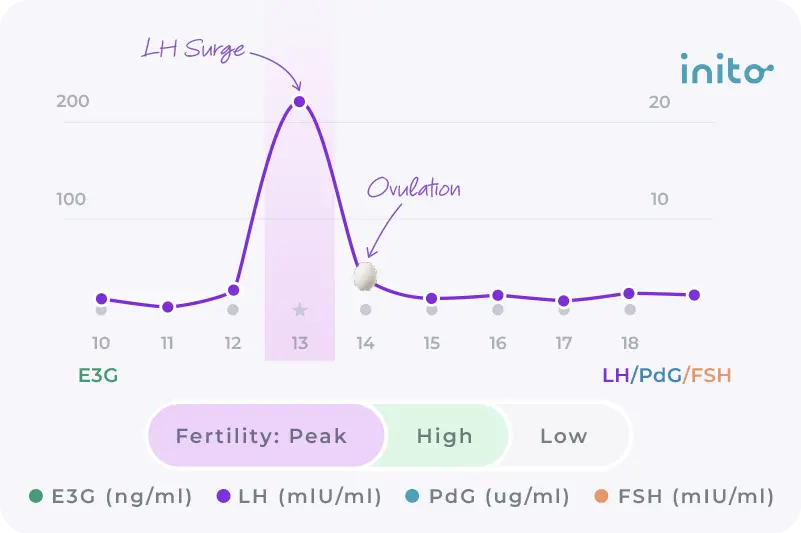Content table
Most men don’t think about their sperm health until they are trying to have a baby with their partner.
Semen health is a topic that largely goes undiscussed, or is not known about. You will probably be surprised to learn that 40 – 50% of the time, male infertility factors contribute to a couple’s inability to conceive.
Studies have also shown that average sperm counts have dropped as much as 50% over the last 50 years.
It takes just one sperm and one egg to meet in order for conception to occur. When a man ejaculates, 20 to 300 million sperm are released in a race to the egg! This means that having a healthy amount of sperm optimizes the chances for pregnancy.
But what if a man has less than the average amount of sperm? This is called low sperm count, or oligospermia.
So, is it possible to produce more sperm? Yes, it is! With lifestyle changes and appropriate supplementation, men can increase their sperm production.
In this blog, we’ll talk more about
What is sperm count and how does it affect fertility?
Sperm count refers to the average number of sperm in one semen sample. When a man has oligospermia, he has fewer than 10 million sperm per milliliter of semen.
You might be thinking, “wait… WHAT?! 10 million sperm trying to get to an egg is LOW?! That still sounds like a lot of sperm!”
It does sound like a lot! However, a sperm’s journey to the egg is arduous. Many sperm won’t make it all the way to the egg. When a man has a low sperm count, even fewer of those little swimmers have a shot at getting to an egg that is waiting to be fertilized.
So while pregnancy isn’t impossible, it might make conceiving more challenging. If the sperm count is low but the motility or shape and size of the actual sperm is normal, then chances for conception aren’t as dismal.
What causes low sperm count?
Your testicles make several million sperm a day. This process is called spermatogenesis. When you break it down, this means that you’re making about 1500 sperm per second! So there is a lot going on in there at any given moment!
This production cycle of spermatogenesis takes approximately 64 days. By the end of a full cycle, you can regenerate up to 8 billion sperm. Your body maintains a surplus, so that way when ejaculation happens, you always release a healthy amount of sperm (anywhere from 20 to 300 million).
When you have a low sperm count, your body simply isn’t producing enough sperm. In many cases, it isn’t obvious what the exact cause for low sperm count could be. Many doctors believe factors that change testosterone levels are the most common cause for low sperm count.
Let’s look at some potential causes for low sperm count:
- Varicocele – A condition that causes enlarged veins in the testicles.
- Infection – Chlamydia, gonorrhea, or prostatitis affect sperm health if left untreated.
- Hypogonadism – The male testicles do not produce enough testosterone.
- Blockage – Sperm must pass through a series of ducts to reach the outside of the body. This includes going through the epididymis, ductus deferens, ejaculatory duct, and urethra. A blockage can be the result of either a birth defect, illness, or injury. Therefore, blockages limit sperm production or the amount of sperm released during ejaculation.
The above ailments can be treated or managed by a healthcare professional. When low sperm count is unexplained, it may be an indication to make some healthy lifestyle changes.
How do I know if I have a low sperm count?
One of the only signs of a low sperm count is the inability to conceive a child after a year of regular intercourse. This is when couples should seek help from a fertility specialist. Men with a low sperm count may also have a low sex drive, or problems with sexual function.
The only way to know you have low sperm count is through semen analysis that checks for your sperm health. This can be tested at a lab after your doctor gives a prescription.
There are also home tests men can purchase to check their sperm count. This seems like a more convenient or private way to test semen. But home tests are not as accurate as tests conducted in a lab. A home test is a great option to see if there are any immediate issues. The results however should be followed up with a visit to a fertility specialist for a more thorough analysis.
How to produce more sperm?
Getting diagnosed with a low sperm count may affect your mental health. Yet it is reversible, but not an overnight fix. Spermatogenesis takes about 64 days (2 months) for sperm to form from a cell to maturity. So the beginning of improvement may take the entire length of a full cycle. So let’s talk about natural remedies for how to produce more sperm.
- Exercise – Men who exercise regularly have higher testosterone levels and better semen quality than inactive men. This study from 2017 shows that regular exercise improved the reproductive hormone levels and semen health in obese men.
- Sleep – Getting enough sleep every night is critical for everyone. Sleep deprivation negatively impacts our overall health and this includes sperm, too!
Research shows that men who get 7 to 8 hours of sleep per night have normal amounts of sperm. When we sleep, it is our body’s opportunity to regenerate cells and restore energy.
So when you’re sleep deprived, your body isn’t likely to produce enough healthy sperm during the spermatogenesis process.
An interesting fact to add, is that melatonin has shown to decrease sperm quality. It seems like everyone today takes a melatonin supplement. Melatonin is a hormone produced by our brains to help us sleep. Taking a melatonin supplement sounds like a good idea. But it might do more harm than good for any man trying to catch some Z’s but increase his sperm production. - Vitamin C – A lack of vitamin C is linked to oxidative stress. Oxidative stress is an imbalance of oxygen-containing molecules called “free radicals” and antioxidant molecules.
When there are more free radicals than antioxidants, the free radicals can cause damage to DNA and proteins in the body. This includes messing with sperm health and count.
Antioxidants are also found naturally in many healthy foods, like citrus fruits. This is why vitamin C is a supplement to consider when wanting to improve sperm count. - Vitamin D – Many men and women alike are low in vitamin D, especially those who spend a lot of time indoors or live in four-season climates. While being low in vitamin D is very common, vitamin D deficiencies in men can cause higher estradiol levels.
This causes a reduced production of testosterone levels. Taking vitamin D supplements is beneficial for improving your sperm count. - Antioxidants – There are more antioxidant supplements to consider adding to your routine! Antioxidants are important because they prevent cell damage. Supplements like CoQ10 and alpha-tocopherol (vitamin E) significantly improve sperm count. They can be purchased at most health or drugstores. Another antioxidant, L-carnitine, also has positive effects on sperm motility and morphology.
- Zinc – Never underestimate the power of zinc! Zinc helps in the production of sperm. Zinc deficiency causes testicular failure and cell damage. Rich food sources of zinc include meat, fish, beans, and nuts.
- Omega 3 Fatty Acids – Eating foods rich in omega 3 (like salmon, nuts, and beans) can result in higher antioxidant activity and therefore, better sperm count.
- Destress – Like lack of sleep, high stress levels wreak havoc on the body in ways we can’t even imagine or predict. Prolonged stress raises cortisol levels which in turn, reduces testosterone production. Our bodies go into fight or flight mode when under stress. When this happens, resources in the body are depleted, including sperm production. Finding ways to eliminate stress are not only going to improve sperm count and semen health, but your overall health too. Exercise as mentioned above, helps to de-stress. So does practicing stillness, meditation, and breathwork. These have major benefits on mental health when practiced for just 5 to 10 minutes per day.
- Occupational Functions – Do you work a physically demanding job?
If so, you may already be producing more sperm naturally! Those who work physically demanding jobs, lift heavy objects regularly, and are on their feet on average have better sperm health. If you are sedentary at work, this means that regular exercise outside of your job is even more important. - Other supplements – Ever heard of ashwagandha, fenugreek, maca root, or tribulus terrestris? No?
That’s OK – read on to know more. Each of these unique supplements claim to support male fertility.
For example, ashwagandha might improve testosterone levels. Maca root has been used in Peru for centuries to improve libido.
These suggestions are natural and backed up by many studies. However, it is still important to discuss making supplementary changes with your doctor first.
What should I avoid when trying to produce more sperm naturally?
In order to produce more sperm, there are several things you can also avoid. The following things are not only detrimental to semen health, but overall health too.
- Processed foods and trans fats – It’s common knowledge that processed foods and trans fats cause lots of different health problems, like heart disease and cancer. How processed foods and trans fats impact semen health is not fully understood yet.
But studies show a diet heavy in trans fats and processed foods result in a low sperm count. - Soy products – Soy products contain phytoestrogens. This is an estrogen-like compound that comes naturally from some plants. Estrogen is the female sex hormone and is not conducive to sperm production. It’s best to avoid soy when actively trying to improve sperm count.
People who are vegan tend to eat lots of soy products because they are a great source of protein. Male vegans trying to increase sperm count should find alternate sources for protein. Beans and legumes are a great place to find protein while avoiding soy. - BPAs – Bisphenol As (BPAs) are linked to decreasing fertility. BPAs are everywhere, making it hard to eliminate. BPA is an industrial chemical, and it is found in cans and food packaging. BPAs can mimic estrogen – just like the phytoestrogens found in soy.
- Full fat dairy products – Environmental chemicals that get into cow’s milk can create hormonal imbalances for the consumers.
- Alcohol – Heavy drinking lowers testosterone levels. Drinking in moderation is not typically an issue, but avoiding daily consumption of alcohol can hopefully improve sperm count. Studies show that excessive drinking is defined as approximately 15 or more drinks per week.
- Smoking/Drugs – Smoking and drugs are bad for you. Period. We all know that. These substances affect every part of the body, including semen health! Countless studies have been done on the effects of smoking and male fertility. After studying men who have quit smoking, it is believed that smoking causes DNA damage in sperm.
Will testosterone supplementation help?
After reading the above do’s and don’ts, you may be wondering if testosterone replacement therapy is an option (taking the hormone itself in a synthetic form prescribed by a doctor).
Ironically, testosterone replacement therapy can actually stop natural sperm production altogether. The brain detects a sudden excess in testosterone and tells the testes to shut down production. If the testes aren’t naturally making testosterone, they aren’t making sperm. The testes can even shrivel up and shrink!
Testosterone replacement therapy is prescribed to men with conditions like hypogonadism. Symptoms of hypogonadism are decreased energy, lack of body hair, and issues with bone density and muscle mass.
Takeaway
With some simple lifestyle changes, it is possible to produce more sperm. In the process, you might become a healthier version of you! So remember the following:
- A man who has 10 million sperm or less per milliliter has a low sperm count.
- Sperm production in the testes is a constant and ongoing process called spermatogenesis.
- A cause for low sperm count isn’t always obvious.
- You should get a semen analysis done through a fertility specialist if you and your partner have not gotten pregnant after a year of unprotected and regular sexual intercourse.
- There is a lot you can do to help improve your sperm count and semen health.
- Adapting a healthy lifestyle through movement and diet is beneficial for both overall health and semen health.
- Stress can negatively affect sperm production. It is important to find out what triggers your stress and to make necessary changes to reduce the amount of stress in your life.
- Taking a synthetic form of testosterone is not an option when it comes to trying to produce more sperm.
- It might take as little as 2 months to see increased sperm production during a semen analysis.
Was this article helpful?
- Spatiotemporal trends in human semen quality | Nature Reviews Urology
- Sperm count is increased by diet-induced weight loss and maintained by exercise or GLP-1 analogue treatment: a randomized controlled trial | Human Reproduction | Oxford Academic
- Occupational factors and markers of testicular function among men attending a fertility center | Human Reproduction | Oxford Academic
- Antioxidant supplements and semen parameters: An evidence based review – PMC
- Improvement in human semen quality after oral supplementation of vitamin C
- The Effect of Omega-3 Fatty Acids, EPA, and/or DHA on Male Infertility: A Systematic Review and Meta-analysis
- Dietary Antioxidant Intake in Relation to Semen Quality Parameters in Infertile Men: a Cross-Sectional Study – PMC












